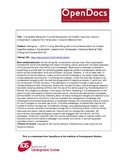Linking Well-Being with Cultural Revitalization for Greater Cognitive Justice in Conservation: Lessons from Venezuela in Canaima National Park
| dc.contributor.author | Rodriguez, Iokine | |
| dc.coverage.spatial | Venezuela | en |
| dc.date.accessioned | 2018-08-03T12:39:45Z | |
| dc.date.available | 2018-08-03T12:39:45Z | |
| dc.date.issued | 2017-06-01 | |
| dc.identifier.citation | Rodriguez, I. (2017) Linking Well-Being with Cultural Revitalization for Greater Cognitive Justice in Conservation: Lessons from Venezuela in Canaima National Park, Ecology and Society 22(4):24 | en |
| dc.identifier.uri | https://opendocs.ids.ac.uk/opendocs/handle/20.500.12413/13981 | |
| dc.description.abstract | Across the globe, conservation policies have often suppressed nonscientific forms of knowledge and ways of knowing nature, along with the social practices of the groups that are informed by such knowledge. Reversing this process of epistemic supremacy is crucial both for achieving greater cognitive justice in conservation areas and ensuring that conservation aims are achieved. Doing so, however, is not an easy task. In situations of cultural violence, hidden environmental knowledge is not easily made visible unless adequate conditions for it to emerge are created. I show that one way forward is by conservation engaging with the well-being agendas of indigenous people, in particular, with the construction of their life plans. This discussion is illustrated through a case study in Canaima National Park, Venezuela, where over the last 20 years, social-ecological research has been studying existing conflicts over the use of fire while supporting the development of Pemon (the indigenous peoples in this area) Life Plans. Assisting in the development of life plans through participatory historical reconstructions, territorial self-demarcation processes, and facilitation of community reflexivity about its social-ecological changes and desired future has been decisive for the Pemon, and has revealed fire management knowledge that challenges conventional explanations of landscape change that simplistically place the blame for such changes on the local use of fire. This local knowledge, combined with results from studies of Pemon fire regimes, fire behavior ecology, and paleoecological research, now informs a counter narrative of landscape change that is influencing a shift in environmental discourse and policy-making toward an intercultural fire management approach. By documenting how social-ecological research has engaged with the Pemon Life Plan processes, I show the important role that cultural revitalization plays in making hidden and silenced local environmental knowledge more visible, and hence, in achieving greater cognitive justice in conservation. | en |
| dc.language.iso | en | en |
| dc.publisher | The Resilience Alliance | en |
| dc.rights | Copyright © 2017 by the author(s). Published here under license by The Resilience Alliance. This article is under a Creative Commons Attribution-NonCommercial 4.0 International License. You may share and adapt the work for noncommercial purposes provided the original author and source are credited, you indicate whether any changes were made, and you include a link to the license. | en |
| dc.rights.uri | http://creativecommons.org/licenses/by-nc/4.0/ | en |
| dc.subject | Environment | en |
| dc.title | Linking Well-Being with Cultural Revitalization for Greater Cognitive Justice in Conservation: Lessons from Venezuela in Canaima National Park | en |
| dc.type | Article | en |
| dc.rights.holder | Copyright © 2017 by the author | en |
| dc.identifier.externaluri | https://www.ecologyandsociety.org/vol22/iss4/art24/ | en |
| dc.identifier.doi | 10.5751/ES-09758-220424 | |
| rioxxterms.funder | Default funder | en |
| rioxxterms.identifier.project | Default project | en |
| rioxxterms.version | VoR | en |
| rioxxterms.versionofrecord | https://doi.org/10.5751/ES-09758-220424 | en |
| rioxxterms.funder.project | 9ce4e4dc-26e9-4d78-96e9-15e4dcac0642 | en |
Files in this item
This item appears in the following Collection(s)
-
ESRC STEPS Centre [225]
Except where otherwise noted, this item's license is described as Copyright © 2017 by the author(s). Published here under license by The Resilience Alliance. This article is under a Creative Commons Attribution-NonCommercial 4.0 International License. You may share and adapt the work for noncommercial purposes provided the original author and source are credited, you indicate whether any changes were made, and you include a link to the license.


